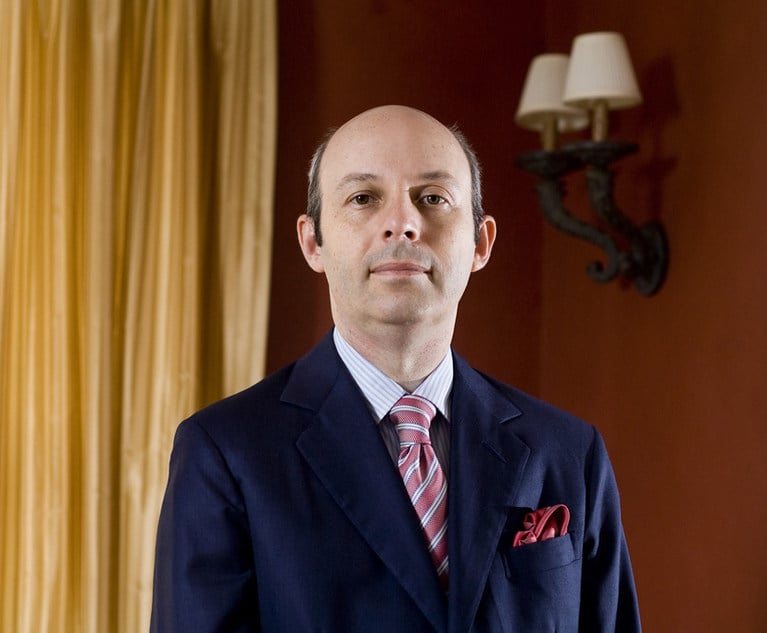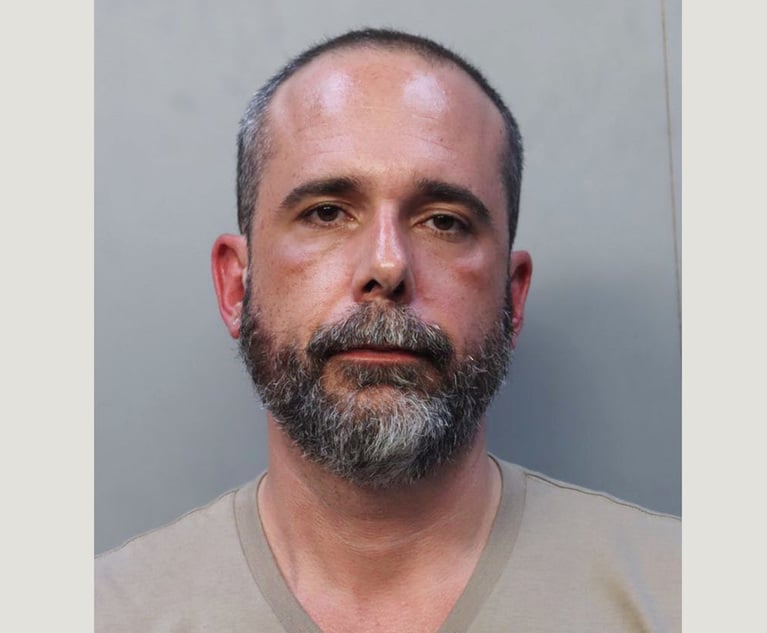High Court Rejects Miami Lawyer's Exoneration; Reassigns Ethics Case
Miami criminal defense lawyer Jonathan Stephen Schwartz is accused of altering photo lineup images for use during a pretrial deposition.
November 07, 2019 at 06:17 PM
4 minute read
 The scales of justice. Photo: Lightspring/Shutterstock.com
The scales of justice. Photo: Lightspring/Shutterstock.com
The Florida Supreme Court disregarded the findings of a court-appointed referee in an attorney-discipline case Thursday.
It instead ruled that Miami criminal defense attorney Jonathan Stephen Schwartz should be disciplined for allegedly altering two defense exhibits and showing them at a pretrial deposition.
The referee, Miami-Dade Circuit Judge Celeste Muir, had recommended no discipline for Schwartz, whom she said had not violated any bar rules because he hadn't acted with the intent to deceive or defraud.
But the justices, ruling per curiam, saw the case differently.
"Here, the referee improperly focused upon Schwartz's asserted motive, which was to provide constitutionally effective assistance of counsel, apparently by attempting to undermine the victim's identification of Schwartz's client," the opinion said.
Instead, the justices said Muir should have focused on "the undisputed fact that Schwartz knowingly and deliberately created the defense exhibits by altering photocopies of the police lineups, and showing them to the victim at the deposition."
Schwartz, admitted to practice in 1986, came under Florida Bar scrutiny after representing a defendant in a Miami-Dade Circuit felony criminal case, State v. Woodson, in 2015. His client was charged and later convicted of armed robbery, according to online case files.
The exhibits were two photocopies of black-and-white police photo lineups, signed by the victim and a police officer, and featured a circle around the head of the defendant. But Schwartz allegedly altered one of those photos by switching his client's image with a different suspect's photo, and altered another by imposing the other suspect's hairstyle onto his client's image.
"Although the images in the exhibits were altered in this manner, they nonetheless retained the circle around subject number five and the signatures of the victim and police officer below the photographs," the opinion said.
The bar claimed that was a violation of Florida Bar Rules 3-4.3 and 8.4(c), which govern misconduct and misrepresentation.
View the lineup photos on pages six and seven of the bar's complaint
 Referee Miami-Dade Circuit Judge Celeste H. Muir. Photo: J. Albert Diaz/ALM.
Referee Miami-Dade Circuit Judge Celeste H. Muir. Photo: J. Albert Diaz/ALM.In Muir's view, Schwartz "made a messy (but clearly not deceitful) effort to comply with State v. Williams" using the photographic lineups, with the aim of testing the accuracy of the victim's statement.
But the high court labeled that conclusion " unsupported by the record and patently erroneous," remarking that Schwartz's exhibits were "deceptive on their face," and went against precedent governing defense discovery involving lineup photos.
"By their very nature, they conveyed the false message that the substituted photograph was the photograph that had been previously identified by the victim," the opinion said.
The opinion further criticized the referee for focusing on how Schwartz had only black and white photos provided by the state to go from, but overlooking the signatures and circles around the suspect.
Schwartz's attorney, Benedict P. Kuehne, said his client was humbled that the court recognized his conduct wasn't intended to deceive the witness.
"Jonathan Schwartz is disappointed by the Florida Supreme Court's reversal of referee Circuit Judge Muir's fact-specific, detailed findings that his efforts to provide a constitutionally effective defense to his client was consistent with the Rules of Professional Conduct. Jonathan takes the Supreme Court's ruling seriously, and will endeavor to comply with the court's instructions in this case of first impression," Kuehne said. "As the Supreme Court acknowledged, his 'absence of a dishonest or selfish motive' is a mitigating factor. Jonathan intends to work diligently in his defense representations to demonstrate his commitment to the highest standards of the legal profession."
The justices also disagreed with a finding that each party should pay its own costs in the case.
They ordered the case assigned to a new referee.
Read the ruling:
More discipline stories:
Referee Finds Against Florida Bar, Lewis Tein; Recommends Exoneration of Miami Lawyer
Former Tripp Scott Director Fighting Disbarment
Florida Lawyers Spar Over Fate of Judge Watson's Attorney, Who Faces Disbarment
This content has been archived. It is available through our partners, LexisNexis® and Bloomberg Law.
To view this content, please continue to their sites.
Not a Lexis Subscriber?
Subscribe Now
Not a Bloomberg Law Subscriber?
Subscribe Now
NOT FOR REPRINT
© 2025 ALM Global, LLC, All Rights Reserved. Request academic re-use from www.copyright.com. All other uses, submit a request to [email protected]. For more information visit Asset & Logo Licensing.
You Might Like
View All
New Charges Expected in Sex Trafficking Case Against Broker Brothers

US Judge Cannon Blocks DOJ From Releasing Final Report in Trump Documents Probe
3 minute read
SCOTUSblog Co-Founder Tom Goldstein Misused Law Firm Funds, According to Federal Indictment
2 minute readTrending Stories
- 1States Accuse Trump of Thwarting Court's Funding Restoration Order
- 2Microsoft Becomes Latest Tech Company to Face Claims of Stealing Marketing Commissions From Influencers
- 3Coral Gables Attorney Busted for Stalking Lawyer
- 4Trump's DOJ Delays Releasing Jan. 6 FBI Agents List Under Consent Order
- 5Securities Report Says That 2024 Settlements Passed a Total of $5.2B
Who Got The Work
J. Brugh Lower of Gibbons has entered an appearance for industrial equipment supplier Devco Corporation in a pending trademark infringement lawsuit. The suit, accusing the defendant of selling knock-off Graco products, was filed Dec. 18 in New Jersey District Court by Rivkin Radler on behalf of Graco Inc. and Graco Minnesota. The case, assigned to U.S. District Judge Zahid N. Quraishi, is 3:24-cv-11294, Graco Inc. et al v. Devco Corporation.
Who Got The Work
Rebecca Maller-Stein and Kent A. Yalowitz of Arnold & Porter Kaye Scholer have entered their appearances for Hanaco Venture Capital and its executives, Lior Prosor and David Frankel, in a pending securities lawsuit. The action, filed on Dec. 24 in New York Southern District Court by Zell, Aron & Co. on behalf of Goldeneye Advisors, accuses the defendants of negligently and fraudulently managing the plaintiff's $1 million investment. The case, assigned to U.S. District Judge Vernon S. Broderick, is 1:24-cv-09918, Goldeneye Advisors, LLC v. Hanaco Venture Capital, Ltd. et al.
Who Got The Work
Attorneys from A&O Shearman has stepped in as defense counsel for Toronto-Dominion Bank and other defendants in a pending securities class action. The suit, filed Dec. 11 in New York Southern District Court by Bleichmar Fonti & Auld, accuses the defendants of concealing the bank's 'pervasive' deficiencies in regards to its compliance with the Bank Secrecy Act and the quality of its anti-money laundering controls. The case, assigned to U.S. District Judge Arun Subramanian, is 1:24-cv-09445, Gonzalez v. The Toronto-Dominion Bank et al.
Who Got The Work
Crown Castle International, a Pennsylvania company providing shared communications infrastructure, has turned to Luke D. Wolf of Gordon Rees Scully Mansukhani to fend off a pending breach-of-contract lawsuit. The court action, filed Nov. 25 in Michigan Eastern District Court by Hooper Hathaway PC on behalf of The Town Residences LLC, accuses Crown Castle of failing to transfer approximately $30,000 in utility payments from T-Mobile in breach of a roof-top lease and assignment agreement. The case, assigned to U.S. District Judge Susan K. Declercq, is 2:24-cv-13131, The Town Residences LLC v. T-Mobile US, Inc. et al.
Who Got The Work
Wilfred P. Coronato and Daniel M. Schwartz of McCarter & English have stepped in as defense counsel to Electrolux Home Products Inc. in a pending product liability lawsuit. The court action, filed Nov. 26 in New York Eastern District Court by Poulos Lopiccolo PC and Nagel Rice LLP on behalf of David Stern, alleges that the defendant's refrigerators’ drawers and shelving repeatedly break and fall apart within months after purchase. The case, assigned to U.S. District Judge Joan M. Azrack, is 2:24-cv-08204, Stern v. Electrolux Home Products, Inc.
Featured Firms
Law Offices of Gary Martin Hays & Associates, P.C.
(470) 294-1674
Law Offices of Mark E. Salomone
(857) 444-6468
Smith & Hassler
(713) 739-1250







